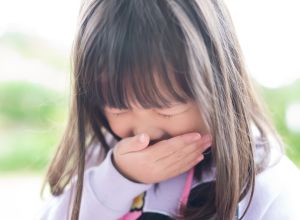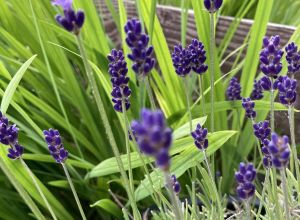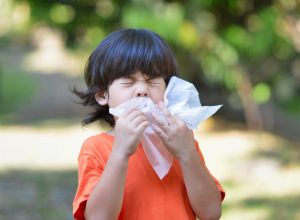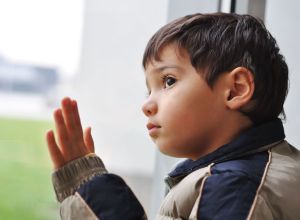What is hay fever?




Rhinitis is when the lining inside the nose and sinuses (mucous membranes) gets irritated and inflamed. Common symptoms are stuffy, itchy or runny nose and sneezing. It can also affect the eyes and throat with itchy, runny eyes and itchy throat. Many things can cause rhinitis e.g. pollen, dust, mould, smoke and animal dander.
Allergic rhinitis happens when pollens, dust mites or other allergens in the air get into your nose and eyes and cause an allergic reaction.
Seasonal allergic rhinitis or hay fever happens to children who are allergic to pollens. Pollens are released into the air by particular grasses or trees. Your child breathes these pollens in, and they irritate the lining of their eyes nose and sinuses. This type of hay fever is usually worse between late March and September especially when it is warm humid and windy. This is when pollen count is at its highest. Hay fever is quite common.
- grass pollen is the most common allergen (May to July)
- tree pollen (February to June)
- weed pollens (June to September)
Up to 50% of UK population report suffering from hay fever symptoms (Allergy UK). Your child has a greater chance of having hay fever if you, your child’s other parent or your other children have an allergy. Teenagers are more likely to get hay fever than younger children.
Perennial rhinitis happens all year round and is caused by other triggers. These could be dust mites in the house, animal fur or hair, and mould spores. If your child gets rhinitis all year round, they may be allergic to one of these triggers.
Infectious rhinitis – the common cold. Rhinitis is most often caused by viruses, the common cold (rhinovirus). Most children will catch between 8-12 mild viral infections a year (about 1 cold a month).
Hay fever symptoms
Common symptoms of hay fever include:
- clear runny nose and sniffing
- blocked nose
- mouth breathing
- sneezing
- itchy eyes, nose, roof of the mouth and back of the throat
- red, sore and watery eyes.
Hay fever isn’t usually serious but if your child is very sensitive to pollens in the air, they can develop other symptoms like wheezing, hives and rashes, especially eczema.
Hay fever can also lead to poor-quality sleep, tiredness and poor concentration during the daytime.
Does your child need to see a doctor about hay fever?
You can get simple advice on medications by asking your pharmacist.
Please take your child to the GP if you’re worried about their hay fever symptoms, or the symptoms get in the way of your child’s daily life.
Tests for hay fever
Your GP might consider doing additional allergy testing or referring your child to a doctor who has experience in allergy. They may for more tests if the symptoms are impacting on your child significantly or it is not clear of the cause. These tests might change the hay fever treatment your child receives.
Hay fever treatment
There’s no cure for hay fever, so treatment aims to manage symptoms and avoid the causes.
Antihistamines syrups or tablets are usually divided into 2 main groups:
- Non-drowsy antihistamines (preferred) e.g. Cetirizine, loratadine and fexofenadine. These medications are less likely to make you feel sleepy.
- Antihistamines that make you feel sleepy e.g. chlorpheniramine (Piriton) and hydroxyzin.
Antihistamine eyedrops can be helpful for eye symptoms. Some of these can be purchased from a pharmacy and others are available on prescription e.g. optanolol (prescription) or sodium cromoglycate (over the counter)
Antihistamine also comes in several different forms including tablets, capsules, liquid syrups, creams, eye drops and nasal sprays. Please asked the pharmacist for advice if you’re unsure which medicine to try as not all antihistamines are suitable for everyone and only some are available over the counter.
Corticosteroid nose sprays are the best treatment for hay fever, especially for a blocked nose. Your child can use them safely throughout the pollen season for seasonal hay fever, or throughout the year for perennial rhinitis. E.g fluticasone (avamys). The mild steroid helps by reducing the inflammation in the nose.
Severe rhinitis caused by pollen or dust that won't go away, your doctor might consider sending your child to a specialist for immunotherapy. Immunotherapy is also known as desensitisation and aims to change the body's immune system and switch off the allergy. This will usually be done under the supervision of a doctor with experience in allergy and started at a hospital.
Allergen Avoidance
Prevention is a big part of hay fever treatment.
- Try to avoid directly exposing your child to pollens during spring and early summer. For example, if your child is playing outside on warm and windy days, you can expect them to have worse symptoms.
- Monitor pollen forecasts daily and stay indoors wherever possible when the count is high (generally on warmer, dry days). Rain washes pollen from the air so counts should be lower on cooler, wet days
- On high pollen days, shower and wash their hair after arriving home and change their clothing
- Avoid drying washing on a clothes-line outside when pollen counts are high
- Apply an effective barrier around the edge of each nostril to trap or block pollens and other allergens and help prevent symptom
What not to do
- do not cut grass or walk on grass
- do not spend too much time outside during high pollen counts
- do not keep fresh flowers in the house (if pollen allergic)
- do not smoke or be around smoke – it makes your symptoms worse
- do not dry clothes outside – they can catch pollen
Can children outgrow their hay fever?
Hay fever symptoms are more common in young people. At present, it is not possible to predict whose hay fever will get better and whose will remain. Some patients will also suffer from asthma and require inhalers.
Met Office pollen calendar for the UK
People with hay fever do not have allergies to all pollens. Pollen from different plants vary during the year. Tree pollen tends to be highest in spring, grass pollen is highest in summer and many weed pollens are highest in autumn:
- tree pollen (e.g. hazel, yew, alder, elm, birch) counts highest in February and March
- grass pollen counts highest in May to August.
- Weed pollen (e.g. rape seed, nettle, mugwort) counts highest in May to September
Pollen forecast - Met Office produces pollen forecasts for 5 days ahead across the whole of the UK.
Other Useful resources:
Allergy UK Hay Fever | Allergy UK | National Charity
Where should you seek help?
- If it is non-urgent, speak to your local pharmacist or health visitor.
- If your child has any of the above features, urgently see your GP. For an urgent out-of-hours GP appointment, call NHS 111.
- You should only call 999 or go to your nearest A&E department in critical or life threatening situations.
Pharmacists are experts in many aspects of healthcare and can offer advice on a wide range of long-term conditions and common illnesses such as coughs, colds and stomach upsets. You don’t need an appointment and many have private consultation areas, so they are a good first port of call. Your pharmacist will say if you need further medical attention.
Sound advice
- Visit a pharmacy if your child is ill, but does not need to see a GP.
- Remember that if your child's condition gets worse, you should seek further medical advice immediately.
- Help your child to understand - watch this video with them about going to the pharmacy.
For information on common childhood illnesses go to What is wrong with my child?
Pharmacists are experts in many aspects of healthcare and can offer advice on a wide range of long-term conditions and common illnesses such as coughs, colds and stomach upsets. You don’t need an appointment and many have private consultation areas, so they are a good first port of call. Your pharmacist will say if you need further medical attention.
Sound advice
- Visit a pharmacy if your child is ill, but does not need to see a GP.
- Remember that if your child's condition gets worse, you should seek further medical advice immediately.
- Help your child to understand - watch this video with them about going to the pharmacy.
For information on common childhood illnesses go to What is wrong with my child?
Health visitors are nurses or midwives who are passionate about promoting healthy lifestyles and preventing illness through the delivery of the Healthy Child Programme. They work with you through your pregnancy up until your child is ready to start school.
Health Visitors can also make referrals for you to other health professionals for example hearing or vision concerns or to the Community Paediatricians or to the child and adolescent mental health services.
Contact them by phoning your Health Visitor Team or local Children’s Centre.
Sound advice
Health visitors also provide advice, support and guidance in caring for your child, including:
- Breastfeeding, weaning and healthy eating
- Exercise, hygiene and safety
- Your child’s growth and development
- Emotional health and wellbeing, including postnatal depression
- Safety in the home
- Stopping smoking
- Contraception and sexual health
- Sleep and behaviour management (including temper tantrums!)
- Toilet training
- Minor illnesses
For more information watch the video: What does a health visitor do?
Health visitors are nurses or midwives who are passionate about promoting healthy lifestyles and preventing illness through the delivery of the Healthy Child Programme. They work with you through your pregnancy up until your child is ready to start school.
Health Visitors can also make referrals for you to other health professionals for example hearing or vision concerns or to the Community Paediatricians or to the child and adolescent mental health services.
Contact them by phoning your Health Visitor Team or local Children’s Centre.
Sound advice
Health visitors also provide advice, support and guidance in caring for your child, including:
- Breastfeeding, weaning and healthy eating
- Exercise, hygiene and safety
- Your child’s growth and development
- Emotional health and wellbeing, including postnatal depression
- Safety in the home
- Stopping smoking
- Contraception and sexual health
- Sleep and behaviour management (including temper tantrums!)
- Toilet training
- Minor illnesses
For more information watch the video: What does a health visitor do?
Midwives provide advice, care and support for women and their babies during pregnancy, labour and the early postnatal period. They provide health education and parenting advice until care is transferred to a health visitor. This usually happens when your baby is about 2 weeks old.
Sound Advice
A midwife is an expert in normal pregnancy and birth.
Midwives provide advice, care and support for women and their babies during pregnancy, labour and the early postnatal period. They provide health education and parenting advice until care is transferred to a health visitor. This usually happens when your baby is about 2 weeks old.
Sound Advice
A midwife is an expert in normal pregnancy and birth.
GPs assess, treat and manage a whole range of health problems. They also provide health education, give vaccinations and carry out simple surgical procedures. Your GP will arrange a referral to a hospital specialist should you need it.
Sound advice
You have a choice of service:
- Doctors/GPs can treat many illnesses that do not warrant a visit to A&E.
- Help your child to understand – watch this video with them about visiting the GP or going to a walk in centre
For information on common childhood illnesses go to What is wrong with my child?
GPs assess, treat and manage a whole range of health problems. They also provide health education, give vaccinations and carry out simple surgical procedures. Your GP will arrange a referral to a hospital specialist should you need it.
Sound advice
You have a choice of service:
- Doctors/GPs can treat many illnesses that do not warrant a visit to A&E.
- Help your child to understand – watch this video with them about visiting the GP or going to a walk in centre
For information on common childhood illnesses go to What is wrong with my child?
If you’re not sure which NHS service you need, call 111. An adviser will ask you questions to assess your symptoms and then give you the advice you need, or direct you straightaway to the best service for you in your area.
Sound advice
Use NHS 111 if you are unsure what to do next, have any questions about a condition or treatment or require information about local health services.
For information on common childhood illnesses go to What is wrong with my child?
If you’re not sure which NHS service you need, call 111. An adviser will ask you questions to assess your symptoms and then give you the advice you need, or direct you straightaway to the best service for you in your area.
Sound advice
Use NHS 111 if you are unsure what to do next, have any questions about a condition or treatment or require information about local health services.
For information on common childhood illnesses go to What is wrong with my child?
A&E departments provide vital care for life-threatening emergencies, such as loss of consciousness, suspected heart attacks, breathing difficulties, or severe bleeding that cannot be stopped. If you’re not sure it’s an emergency, call 111 for advice.
Sound advice
A&E departments provide vital care for life-threatening emergencies, such as loss of consciousness, suspected heart attacks, breathing difficulties, or severe bleeding that cannot be stopped. If you’re not sure it’s an emergency, call 111 for advice.
Sound advice
School nurses care for children and young people, aged 5-19, and their families, to ensure their health needs are supported within their school and community. They work closely with education staff and other agencies to support parents, carers and the children and young people, with physical and/or emotional health needs.
Contacting the School Nurse
Primary and secondary schools have an allocated school nurse – telephone your child’s school to ask for the contact details of your named school nurse.
There is also a specialist nurse who works with families who choose to educate their children at home.
Sound Advice
Before your child starts school your health visitor will meet with the school nursing team to transfer their care to the school nursing service. The school nursing team consists of a school nursing lead, specialist public health practitioners and school health staff nurses.
They all have a role in preventing disease and promoting health and wellbeing, by:-
- encouraging healthier lifestyles
- offering immunisations
- giving information, advice and support to children, young people and their families
- supporting children with complex health needs
Each member of the team has links with many other professionals who also work with children including community paediatricians, child and adolescent mental health teams, health visitors and speech and language therapists. The school health nursing service also forms part of the multi-agency services for children, young people and families where there are child protection or safeguarding issues.
School nurses care for children and young people, aged 5-19, and their families, to ensure their health needs are supported within their school and community. They work closely with education staff and other agencies to support parents, carers and the children and young people, with physical and/or emotional health needs.
Contacting the School Nurse
Primary and secondary schools have an allocated school nurse – telephone your child’s school to ask for the contact details of your named school nurse.
There is also a specialist nurse who works with families who choose to educate their children at home.
Sound Advice
Before your child starts school your health visitor will meet with the school nursing team to transfer their care to the school nursing service. The school nursing team consists of a school nursing lead, specialist public health practitioners and school health staff nurses.
They all have a role in preventing disease and promoting health and wellbeing, by:-
- encouraging healthier lifestyles
- offering immunisations
- giving information, advice and support to children, young people and their families
- supporting children with complex health needs
Each member of the team has links with many other professionals who also work with children including community paediatricians, child and adolescent mental health teams, health visitors and speech and language therapists. The school health nursing service also forms part of the multi-agency services for children, young people and families where there are child protection or safeguarding issues.



